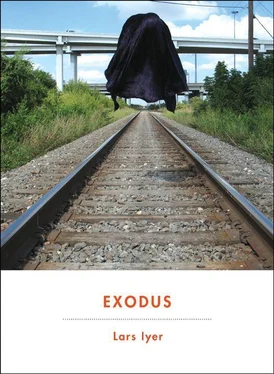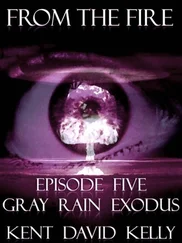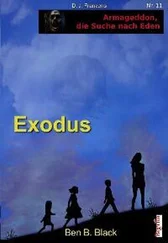There can be no thought from a regenerated city , W. says, as we look up at the warehouses converted into luxury flats. There can be no thought without dilapidation! No thought without urban blight !
Of course, I’m exactly the kind of person who would be drawn to Manchester, W. says. Exactly the type to make the Mancunian mistake .
I romanticised Mancunian despair, W. says. I didn’t realise that Mancunian despair is only the desire to leave Manchester, the city in which I had just marooned myself in my error.
W. sees me as a young student, quite lost in Manchester. He sees me: a speck, an atom, rucksack on my back, trying to find my way around. Didn’t I understand that the city was no place for me? That it was hard enough for those who belonged there?
What did I think I was doing? Whose life did I think I was leading? Did I think I could just become a man of the north? Did I think that northern despair had anything to do with my supposed despair? Did I think that the desolated landscapes of Manchester were the correlate of my supposed desolation?
The Mancunian soul is old and dark, W. says. The Mancunian soul has depths I cannot understand. Complexities! Did I think the Mancunian music that drew me to the city appeared from nowhere? Did I think Joy Division could happen just like that ? Ian Curtis? Early New Order?
It is the poor who are the key to Manchester, W. says. The disenfranchised. The same people whose misery Engels documented, in his account of the city. Cotton workers spitting blood. Mill labourers with curved spines. Hollow-eyed children wandering among rubbish heaps …
Engels thought the poor would revolt, W. says. Hadn’t Manchester been the city of protest? The city of Chartism? Ah, but the merchants of Manchester crushed the workers’ movement. They massacred the protestors on the common land of St Peter’s Field, and built the Free Trade Hall on the site of the massacre, mocking the dead, laughing at them. But Engels thought the north would rise again. He thought Manchester, the first city of the industrial revolution, would become the first city of the workers ’ revolution.
But the merchants of Manchester borrowed new models of internal organisation from the military — they borrowed bureaucracy , and the chain of command . The worker was encouraged to defer gratification , to develop long-term goals and self-discipline , in view of future rewards …
That’s how the merchants of Manchester placed blinkers over the workers’ eyes, W. says. That’s how they placed a muzzle over the workers’ mouths, and an iron collar around the workers’ necks. And so Manchester became the Egypt of the workers’ captivity. It became a workhouse , an open prison.
But Engels knew their end would come eventually, the merchants of Manchester, W. says. Capital is always greater than you, that’s the lesson. Investors move elsewhere. Trade becomes unprofitable. Firms go out of business. Whole regions are ruined by capital flight …
The Mancunian textile industry was destroyed by foreign competition. Its independent banks closed or relocated to London. Mass manufacturing became unprofitable, and mass unemployment arrived for good …
And Manchester fell asleep, W. says. The north had been broken, its industries destroyed. And Manchester lay down on its plain and slept. And as it turned in its sleep, Mancunian despair echoed in back-lane recording studios. As Manchester stirred uneasily, Mancunian horror sang on stage and record …
And idiots like me came to Manchester, didn’t they? W. says. Idiot-tourists, drawn by the depths of the Mancunian soul, by Mancunian melancholy. Idiots wandered among the derelict warehouses, and along the old viaducts and deserted towpaths. Idiots with their rucksacks came to live in the ruins.
‘Think of what others might have achieved in your place’, W. says. ‘Think of what others might have done had they been given what you were given’. A desk. A computer. A set of bookshelves. And time , W. says. Above all: time .
I’m a usurper, aren’t I? W. says. I’ve taken the place someone else should have had. Someone cleverer than me, of course, W. says. More hard-working. Yes, he can picture it, W. says. Someone slimmer than me, dressed in a black shirt and black jeans. Someone taller than me, built like a missile of thought.
God knows, I’ve taken his place, too, W. says. I’ve taken his time. In fact, I’ve taken everyone’s time, everyone who’s had to listen to me, and, heaven forfend, to read me.
‘Why do you write such bad books?’, W. wonders, as he often does. Of course, it’s a sign that something has collapsed that I can publish anything at all. Do I think I could have published something in the old days? , he says. Do I think I could have brought out a first book and then a second book when there were proper publishers and proper editors?
Ah, how did I slip past the gatekeepers? How did I slip a first book and then a second book past them? I thought I’d been cunning — I thought I’d been clever, W. knows that. Here’s a chance, here’s a niche, I thought. No one’s looking, I thought. A doorway has opened, and if I just sneak through …
I thought I’d seen an opportunity, W. says . I thought I’d seen something no one else had seen: a chance, a possibility. I thought I’d got one over on the world , which in fact I hadn’t. I thought I’d stolen a march on the real thinkers, the real writers, who were too busy procrastinating to seize the day .
Oh, they might be able to think, they might be able to write, but only I’m hungry enough , that’s what I thought, isn’t it? Only I’m keen enough to see the situation for what it is, and take advantage of it , that was it, wasn’t it? Only I’m desperate enough: that’s what I told myself. I’ve been out in the cold so long , I whimpered to myself. I’ve suffered enough , I wept to myself, and the tears glistened on my cheeks.
I was a member of the real world , that’s what I thought, wasn’t it? W. says. I was in the business of marketing, of self -marketing, as you have to be in the real world, that’s what I said to myself. And when there was an opportunity, when there was a chance to publish, why should I hold back?
I knew I was writing rubbish, that’s what gets to him, W. says. I was gleefully writing rubbish, gleefully publishing rubbish … They’ll publish any old thing! , I cried to myself. They’ll accept any old drivel!
Shamelessness : that was it, W. says. I am a shameless man. Let the others procrastinate, I have a book to publish , I thought. Let the thinkers think, let the writers write, but there’s an opportunity here … I’m going to slip by unnoticed. I’m going to pass through the gates of publication like an opportunistic ninja …
And I did, didn’t I?: I slipped by unnoticed, W. says. No search lights found me. No klaxons went off, no SWAT teams appeared at my door, no snipers picked me off from rooftops. There was nothing — only eerie silence, as after heavy snow. Nothing — just metaphorical snowbanks, white and silent; just the metaphorical sky, white and silent. My first book was published — and nothing happened. My second book — and nothing happened.
‘Even you, even you hoped you wouldn’t get away with it’, W. says. I wanted to be stopped! I wanted to be punished. I wanted my gleeful smile to be wiped from my face. — ‘Something in you knows you’ve done wrong’.
Читать дальше












